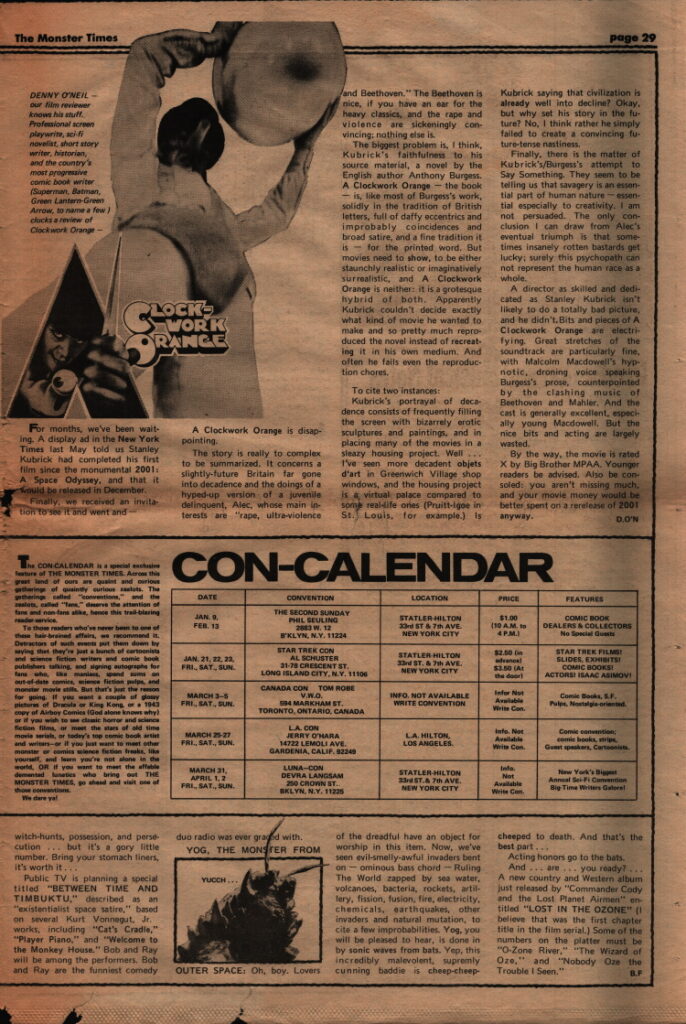by Denny O’Neil

DENNY O’NEIL – our film reviewer knows his stuff. Professional screen playwright, sci-fi novelist, short story writer, historian, and the country’s most progressive comic book writer (Superman, Batman, Green Lantern-Green Arrow, to name a few) clucks a review of Clockwork Orange –
For months, we’ve been waiting. A display ad in the New York Times last May told us Stanley Kubrick had completed his first film since the monumental 2001: A Space Odyssey, and that it would be released in December.
Finally, we received an invitation to see it and went and –
A Clockwork Orange is disappointing.
The story is really to complex to be summarized. It concerns a slightly-future Britain far gone into decadence and the doings of a hyped-up version of a juvenile delinquent, Alec, whose main interests are “rape, ultra-violence and Beethoven.” The Beethoven is nice, if you have an ear for the heavy classics, and the rape and violence are sickeningly convincing; nothing else is.
The biggest problem is, I think, Kubrick’s faithfulness to his source material, a novel by the English author Anthony Burgess. A Clockwork Orange – the book – is, like most of Burgess’s work, solidly in the tradition of British letters, full of daffy eccentrics and improbably coincidences and broad satire, and a fine tradition it is – for the printed word. But movies need to show, to be either staunchly realistic or imaginatively surrealistic, and A Clockwork Orange is neither: it is a grotesque hybrid of both. Apparently Kubrick couldn’t decide exactly what kind of movie he wanted to make and so pretty much reproduced the novel instead of recreating it in his own medium. And often he fails even the reproduction chores.
To cite two instances:
Kubrick’s portrayal of decadence consists of frequently filling the screen with bizarrely erotic sculptures and paintings, and in placing many of the movies in a sleazy housing project. Well… I’ve seen more decadent objets d’art in Greenwich Village shop windows, and the housing project is a virtual palace compared to some real-life ones (Pruitt-Igoe in St. Louis, for example.) is Kubrick saying that civilization is already well into decline? Okay, but why set his story in the future? No, I think rather he simply failed to create a convincing future-tense nastiness.
Finally, there is the matter of Kubrick’s/Burgess’s attempt to Say Something. They seem to be telling us that savagery is an essential part of human nature – essential especially to creativity. I am not persuaded. The only conclusion I can draw from Alec’s eventual triumph is that sometimes insanely rotten bastards get lucky; surely this psychopath can not represent the human race as a whole.
A director as skilled and dedicated as Stanley Kubrick isn’t likely to do a totally bad picture, and he didn’t. Bits and pieces of A Clockwork Orange are electrifying. Great stretches of the soundtrack are particularly fine, with Malcolm MacDowell‘s hypnotic, droning voice speaking Burgess’s prose, counterpointed by the clashing music of Beethoven and Mahler. And the cast is generally excellent, especially young MacDowell. But the nice bits and acting are largely wasted.
By the way, the movie is rated X by Big Brother MPAA. Younger readers be advised. Also be consoled: you aren’t missing much, and your movie money would be better spent on a rerelease of 2001 anyway.
